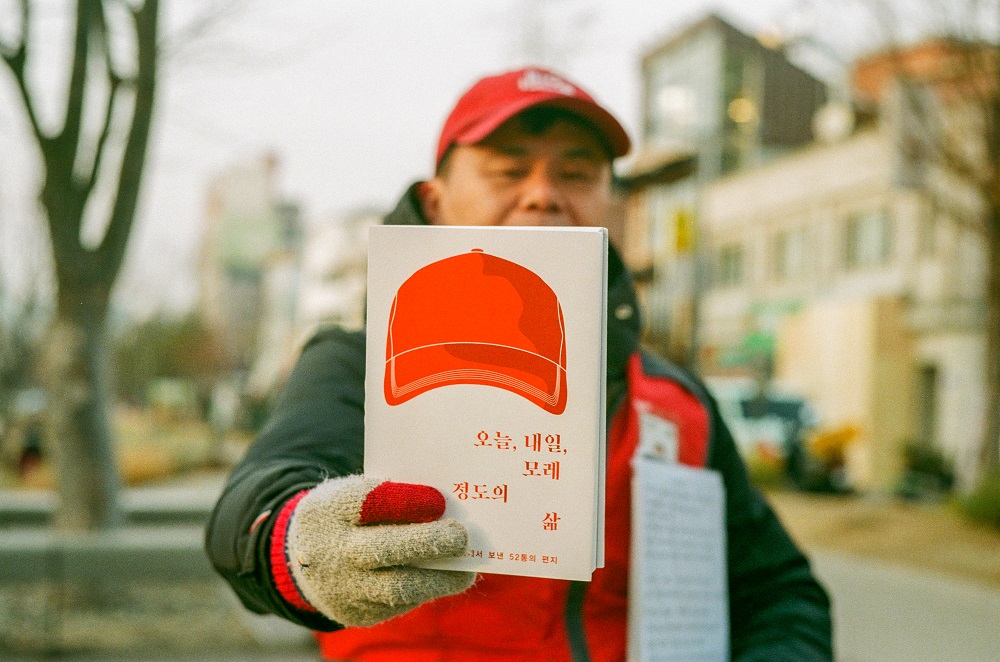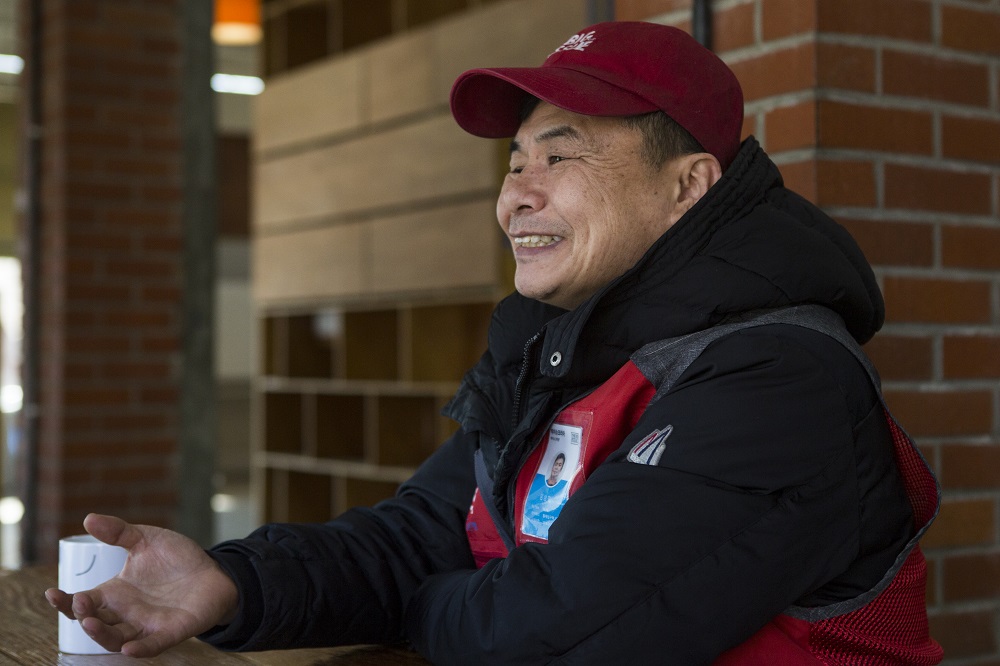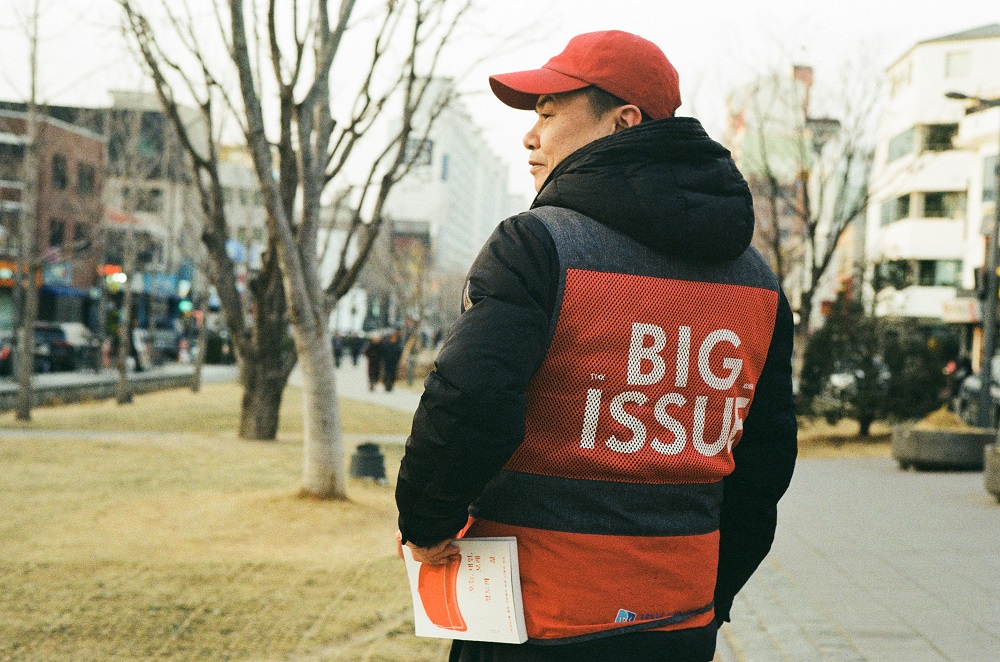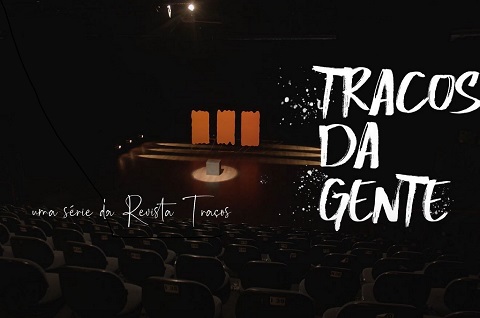By Yumi Son, The Big Issue Korea
Although Sangcheol has seen a ray of hope in the Big Issue after 18 years of homelessness, he quickly learned that being a Big Issue vendor is not easy. However, cold shoulders and blank stares could not stop him. Instead of closing himself off, Sangcheol opened himself up and started telling his story. His recently published book, <오늘, 내일, 모레 정도의 삶>, [which translates literally to Today, tomorrow, the life of the day after tomorrow] is a collection of 52 letters he has written to the world about life selling street papers. When he arrived at The Big Issue Korea office for the following interview, he was holding his book in his hand instead of Big Issue magazines.

The Big Issue Korea: Congratulations on your new book.
Sangcheol: Thank you very much. I have received lots of lovely comments from my fellow vendors as well. It doesn’t feel like it is really happening – I have been preparing for this for such a long time. Nonetheless, I am very pleased.
What made you want to write?
When I started selling the Big Issue six years ago, people didn’t know much about it. They were more curious to know more about the homeless vendors than the magazines, which can be quite uncomfortable. However, I wanted to face it, rather than to avoid it. So, I decided to tell my story to the world and started writing.
I would imagine talking about your life is not an easy job to do.
I’ve gone through hard times – I have been sleeping rough for 18 years. I am not saying I had a dramatic, hellish life, but I always wanted to turn my life around. Becoming a Big Issue vendor gave me the confidence I needed to make a better version of me one day at a time through writing.
I heard your book came by chance.
I would call it serendipity rather than chance. Doesn’t everything good in life come through serendipity? Hyunwoo Jeong, who played a pivotal role in getting my book published, is a regular Big Issue reader and has been buying the magazines from me. He was intrigued by my letters, which I gave out with the magazines. It turned out that he works for a publisher and the rest is history. It was beautiful serendipity.
You wrote the 52 letters in a year. It looks like you’ve been sharing deadlines with the Big Issue.
(Laughing) You are quite right. I now have a very good understanding of the challenges and difficulties editors go through. When I was feeling unwell or couldn’t think of anything to write about, I missed the deadlines a few times.

I saw you wrote the stories of your past – stories of your childhood and youth – very vividly.
When I was a rough sleeper, I completely forgot about my past as I was just too busy trying to survive one day at a time. Once I was set on writing, I started to revisit my past. Looking at the people passing by with their families and friends, I remembered my loved ones from the past. I scribbled down bits and pieces whenever I could.
It sounds like quite a lonely and emotional process.
At times, it felt like that. But I didn’t want to give up. My past is part of me. I need to embrace it.
Are we going to be able to read the 53rd letter soon?
I decided to wrap it up. As you know very well as a journalist, making the deadline is extremely hard work. I think I have told my story to the fullest extent through my 52 letters. As a matter of fact, I would like to talk about my art rather than my life from now on.
Do you mean your art work?
Indeed. I am completely taken by it these days. Now that I am registered as a member of the Korea Disability Arts Association, I plan to dedicate all my time completely to my art work in addition to selling The Big Issue. If I have another opportunity to publish a book, I would like to talk about my art and myself as an artist. How does that sound? Do you think it’s a good idea? (laughing)
I think it’s a fantastic idea.
Before my book was published, I saw an enormous dragon in a dream. I hugged it as tightly as possible. After this auspicious dream, something wonderful happened to me. So, I hope something wonderful happens to everyone who crosses paths with my book.
Do you feel pressure as a published writer?
It would be a lie if I say I don’t. It’s unlikely for a nobody like me to get a book published. If my book does well, another nobody will be able to get an opportunity to get their book published. I would love to give hope to the hopeless.

You are already an inspiration to many.
I was homeless for a whopping 18 years. It was such a long time. Then, The Big Issue provided me with a place to call home. I am a Big Issue vendor by day and an artist by night. I hear people talk about “spoon classes” these days. Some were born with a silver spoon in their mouth and some others were born with a plastic spoon. Although I would say I was born with a dirty spoon in my mouth, I’ve come this far – I believe you can shine, too.
Home sweet home and a life as an author – finally, your dreams have come true. Is there anything else you want to achieve?
This is only the beginning. I would like to become a full time artist and graduate from The Big Issue. I’d like to hold an exhibition and would like to live in Iceland even if it’s for a short while. I hope you would interview me when I have my first solo exhibition.
I am honoured to bring your good news to street paper readers. Would you like to say something to them before we finish our interview?
I still cannot believe that my stories for The Big Issue readers turned into a book. I’d like to thank my customers for taking the time to read my letters, and my 234 crowd-funding supporters. I really hope my book will put a smile on the faces of all those who helped me during the process. Lastly, I wish all my readers a better tomorrow.
Translated from Korean by Yana Maquieira




















